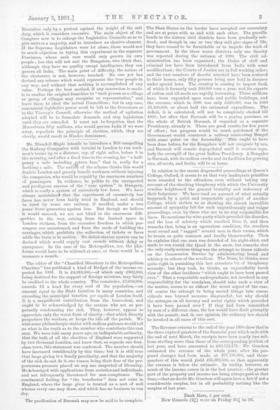The editor of the "Classified Directory to the Metropolitan 'Charities"
has published a kind of Budget of the income ex- pected for 1891. It is 24,918,000,—of which only £962,000, being destined for the support of foreign missions, may fairly be credited to the whole country. The remainder, £3,956,000, -exceeds 21 a bead for every soul of the population,—an amount equal to the State taxation in many countries, and exceeding the municipal taxation per capita of London itself. It is a magnificent contribution from the benevolent, and ought to be acknowledged by the orators who arc so per- petually condemning the rich. They, however, appear to appreciate only the worst form of charity—that which directly pauperises the workers, or keeps the idle off the parish. We wish some philanthropic statist with endless patience would tell as what is the truth as to the number who contribute this vast .sum. We were told many years ago, on indisputable authority, that the bulk of all the charities of England were supported by two thousand families, and know that, as regards one first- -class town, this statement was confirmed. The number should have increased considerably by this time; but it is still true that large giving is a family peculiarity, and that the majority -of the rich do not do it, one reason being their fear of the pre- posterous pressure placed on any one suspected of liberality. He is beseiged with applications from societies and individuals, and not infrequently threatened for non-compliance. The continental feeling for "the benefactor" does not exist in England, where the large giver is treated as a sort of well whence every one may draw, and which has no business to run dry.














































 Previous page
Previous page